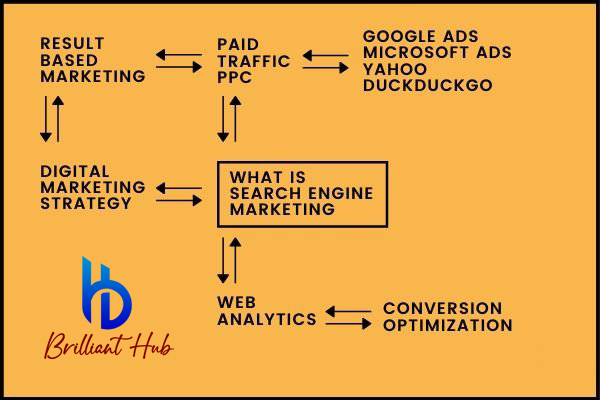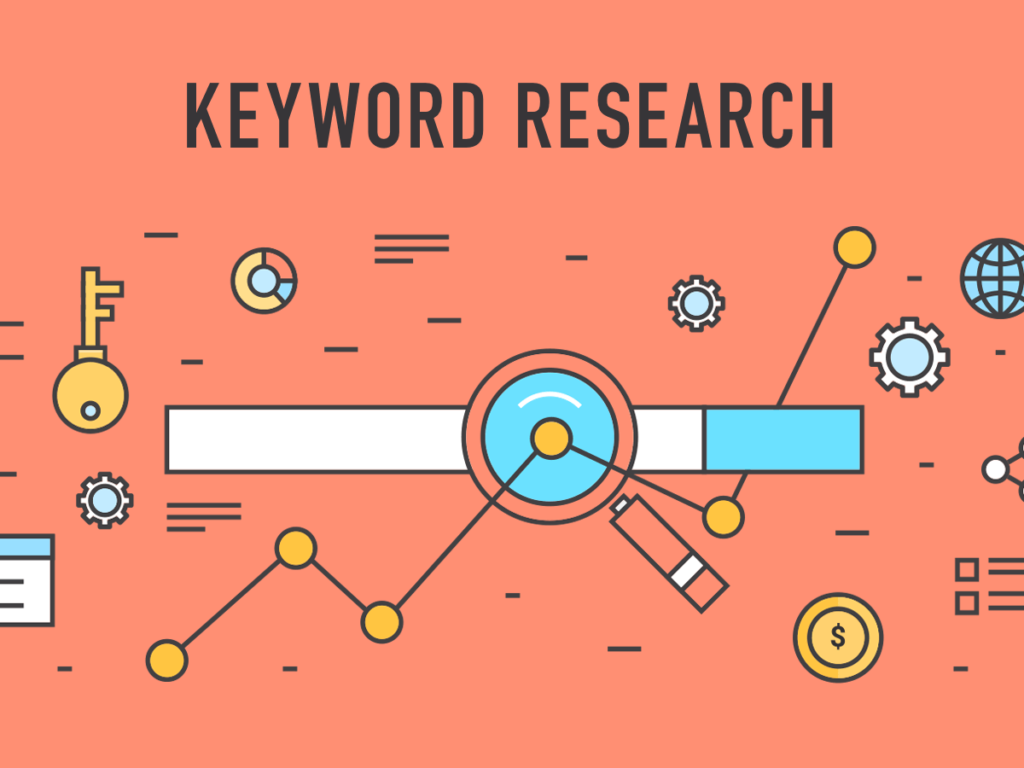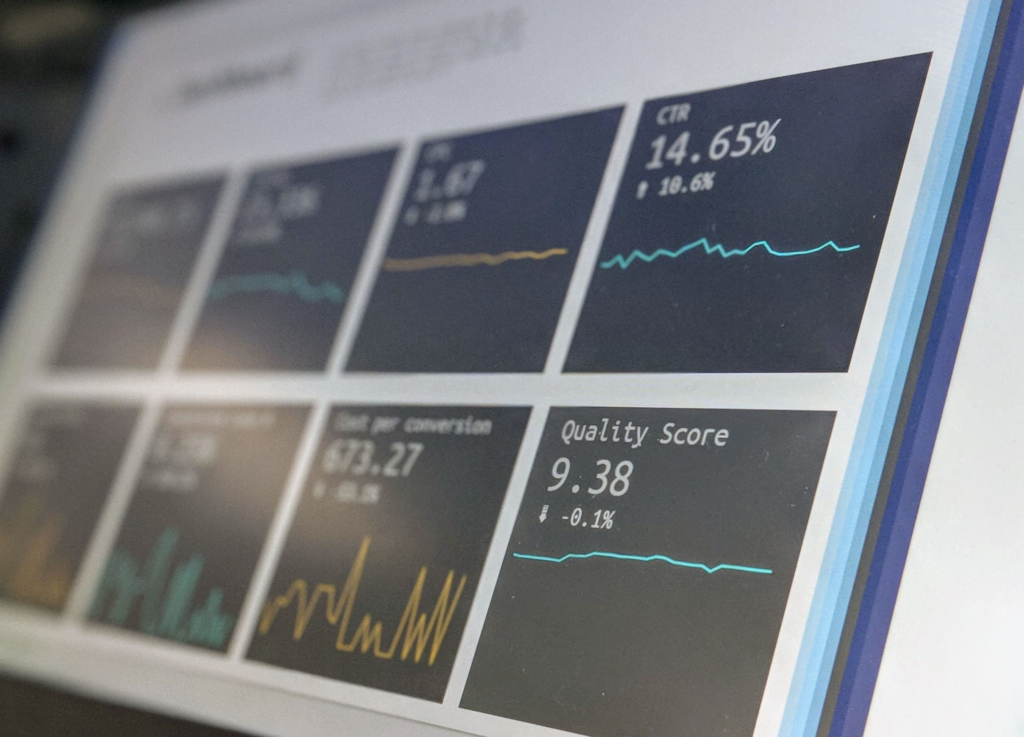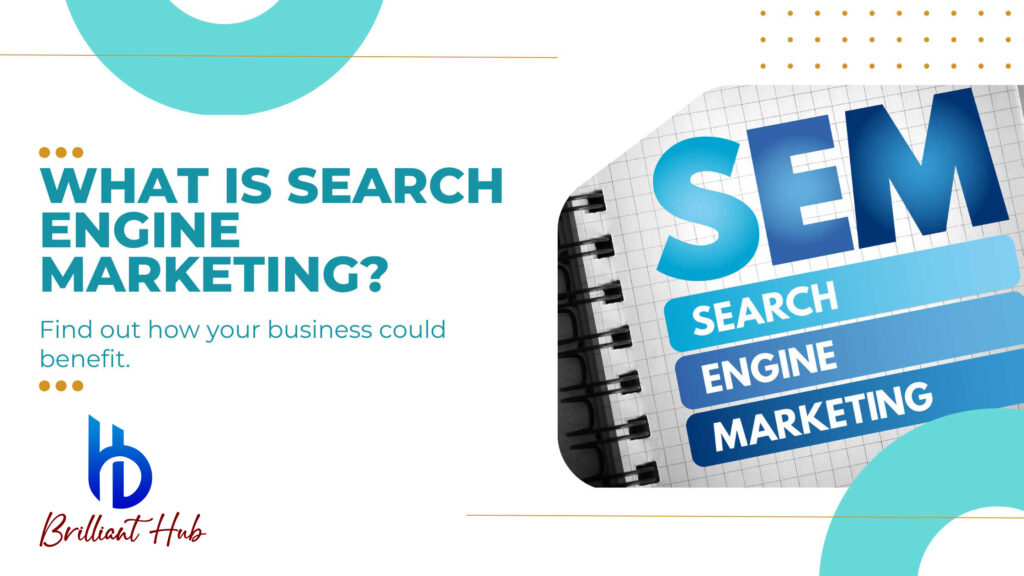If you’re new to the world of digital marketing or looking to enhance your online presence, Know About Search Engine Marketing (SEM) is a term you should familiarize yourself with. In this extensive guide, we’ll take you on a journey through the intricate landscape of SEM, covering everything from its basics to advanced strategies. Whether you’re a business owner, marketer, or simply curious about SEM, you’re in the right place.
What is Search Engine Marketing? Know About Search Engine Marketing
Search Engine Marketing, often abbreviated as SEM, is a powerful digital marketing strategy that revolves around enhancing a website’s visibility in search engine results pages (SERPs) through paid advertising. SEM is all about promoting your website to appear prominently when users search for specific keywords or phrases on popular search engines like Google, Bing, or Yahoo.

SEM combines two primary approaches:
- Pay-Per-Click (PPC) Advertising: In PPC advertising, businesses bid on keywords related to their products or services. When a user’s search query matches these keywords, the ads appear at the top or bottom of the SERP. Advertisers only pay when a user clicks on their ad, making it a cost-effective way to drive traffic.
- Search Engine Optimization (SEO): SEO focuses on optimizing your website’s content and structure to achieve higher organic (non-paid) rankings on SERPs. Effective SEO ensures that your website appears in the top results for relevant search queries.
The Importance of SEM – Know About Search Engine Marketing
Why should you care about SEM? Here are some compelling reasons:
- Immediate Visibility: Unlike SEO, which can take time to show results, SEM provides instant visibility for your business. Your ads can start appearing in search results almost immediately after setup.
- Targeted Advertising: SEM allows you to target specific demographics, locations, and devices. This precision ensures that your ads reach the right audience at the right time.
- Measurable Results: SEM offers robust tracking and analytics tools, allowing you to measure the performance of your campaigns accurately. You can track metrics like Click-Through Rate (CTR), Conversion Rate, and Return on Investment (ROI).
Components of SEM – Know About Search Engine Marketing
SEM comprises several components that work together to create successful campaigns. Let’s delve into them:
1. Keyword Research
Keyword research is the foundation of any SEM strategy. It involves identifying the keywords and phrases that potential customers are likely to use when searching for products or services. Tools like Google Keyword Planner can assist you in this process.

2. Ad Creation
Crafting compelling ad copies is crucial for SEM success. Your ads should be concise, persuasive, and relevant to the user’s search query. Highlight your unique selling points and include a clear call-to-action (CTA) to encourage clicks.

3. Budget Allocation
Determine your advertising budget and allocate it strategically across your campaigns. Keep in mind that different keywords may have varying levels of competition and cost.
4. Bid Management
Bid management involves setting the maximum amount you’re willing to pay for a click on your ad. It’s essential to monitor and adjust your bids regularly to ensure optimal campaign performance.
Optimizing Your SEM Campaign – Know About Search Engine Marketing
Optimization is an ongoing process in SEM. Here’s how you can continually improve your campaigns:
1. Ad Copy Optimization
Regularly review and update your ad copies to improve CTR and conversion rates. A/B testing can help you identify the most effective ad variations.
2. Landing Page Optimization
Ensure that your landing pages are user-friendly, load quickly, and are optimized for conversions. A seamless user experience can significantly impact your campaign’s success.
3. Remarketing
Remarketing allows you to target users who have previously visited your website with personalized ads. This helps re-engage potential customers and boost conversions.
4. Geo-Targeting
Geo-targeting enables you to display ads to users based on their geographical location. This localization can make your campaigns more relevant and effective.
5. A/B Testing
Experiment with different ad variations to determine which elements resonate best with your audience. Testing headlines, ad copy, and visuals can lead to improved performance.
6. Mobile Optimization
Given the increasing use of mobile devices, ensure that your SEM campaigns are mobile-friendly. Mobile optimization can significantly expand your reach.
Measuring SEM Success – Know About Search Engine Marketing
To gauge the effectiveness of your SEM campaigns, you should track key metrics such as CTR, Conversion Rate, and ROI. Utilize analytics tools like Google Analytics and Google Ads to gather valuable data and insights.

Challenges in SEM – Know About Search Engine Marketing
While SEM offers numerous benefits, it comes with its set of challenges:
- Ad Fatigue: Users may become immune to your ads if they see them too frequently. To combat ad fatigue, rotate ad creatives and refresh your content regularly.
- Rising CPC (Cost Per Click): Increased competition can drive up CPC, impacting your budget. Efficient bid management and keyword optimization are essential to mitigate this challenge.
- Ad Quality Score: Maintaining a high ad quality score is crucial. Ensure relevance and quality in your ads and landing pages to improve your score.
Future Trends in SEM – Know About Search Engine Marketing
As technology evolves, SEM is poised to undergo significant changes. Stay updated with emerging trends like voice search optimization, artificial intelligence, and video advertising to remain competitive in the digital marketing landscape.
Conclusion
Search Engine Marketing is a dynamic and essential tool for businesses seeking to thrive in the digital age. By understanding its components, benefits, and best practices, you can harness the full potential of SEM to drive targeted traffic and achieve your marketing goals.
FAQs
Q: Can you explain the difference between SEO and SEM?
A: Certainly! SEO (Search Engine Optimization) focuses on optimizing your website to rank higher in organic search results, while SEM (Search Engine Marketing) includes paid advertising to achieve visibility on search engine results pages (SERPs).
Q: Is SEM suitable for small businesses with limited budgets?
A: Yes, SEM can be tailored to suit small budgets. Careful keyword selection and budget allocation can help small businesses effectively utilize SEM to reach their target audience.
Q: Do I need a website to run SEM campaigns?
A: While having a website is beneficial, you can create simple landing pages to direct SEM traffic if you don’t have a full website. However, having a website provides a better user experience.
Q: How do I combat ad fatigue in my SEM campaigns?
A: To combat ad fatigue, regularly refresh your ad creatives, rotate ad variations, and experiment with different messaging and visuals to keep your audience engaged.
Q: Are there any free SEM tools available?
A: Yes, there are free SEM tools like Google Keyword Planner and Google Analytics that can help with keyword research and campaign analysis.
Q: What is the future of SEM, and how can I stay ahead of the curve?
A: The future of SEM includes trends like voice search optimization and AI-driven advertising. To stay ahead, stay informed about emerging technologies and adapt your strategies accordingly.

